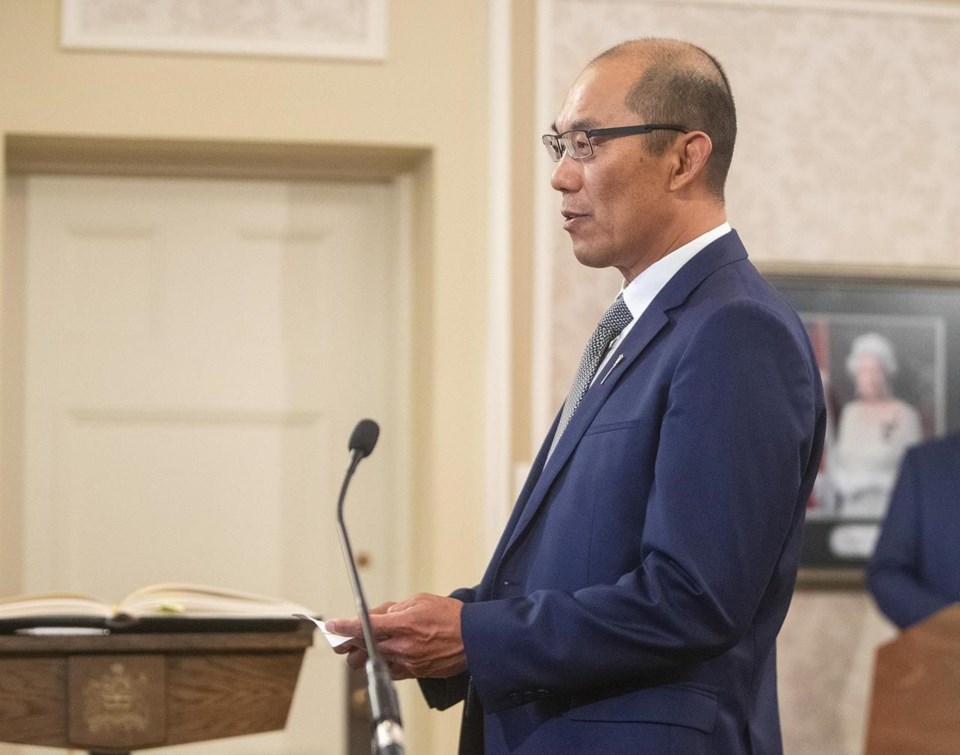CALGARY — The Alberta government's abrupt halt of a project aimed at reducing drug overdoses sowed confusion, anger and panic, emails and messages from those involved show.
The Canadian Press obtained more than 400 pages of internal documents, including emails written by Alberta Health Services and government staff. Those, in addition to messages from and interviews with project members, detail shock at the government stepping in to stop a project run by an arm's-length agency.
The Virtual Overdose Response pilot project, led by Alberta Health Services, agreed to pause the study on June 18, 2020, under the direction of Jason Luan, then associate minister of mental health and addictions. It was less than 24 hours before the project was supposed to launch.
The government had learned of the program's existence just that day through media reports, a ministry spokesperson said in a statement Wednesday.
The government called into question the program's safety and ethics, despite the first phase of the study having already received ethics approval from Alberta's two largest universities.
"(Expletive) has hit the fan hard," said someone involved in the project about the time of the abrupt pause. "I am livid about how this all went down," another project member said. The Canadian Press has agreed not to name either person because of potential risk to their careers.
The pilot would have provided a small group access to a 24-hour phone line staffed by operators who had experience with drug use and who could alert emergency services if a caller became unresponsive.
The team was awarded $900,000 in 2019 through a partnership between Alberta Health Services and Alberta Innovates to run the three-year study.
Emails show Luan's press secretary talked with AHS staff for hours before the pause. She made no mention of the fast-approaching change of tack.
When the 11th-hour pause became known to AHS employees, emails show they scrambled to understand what was going on.
"I'll admit I'm a bit lost here as to what is happening," reads one email sent at 10 p.m. that night after the writerwas alerted the government was asking an AHS doctor to do media interviews on the project. "Is it unpaused?"
A senior AHS employee replied: "I think the ministry is trying to do damage control."
The next morning, another wrote: "But what will our answer be when the reporter asks if the program may or may not restart?"
Everything had already been in place to begin the study. Interviews and documents indicate operators had been hired and trained, salaries were being paid, community partners were secured and at least one person was on board for the trial.
Those involved in the pilot "pushed back significantly" and tried for months to maintain its pulse. But it quietly flatlined in October, said one project member.
Soon after the pause, the government appointed what it called a recovery advisory council to replace an existing expert council.
Premier Jason Kenney's United Conservative government has been critical of harm reduction programs in a push for more recovery-focused supports.
A memo from AHS, sent in March 2021, said recommendations from the new council led to the program's collapse. It said the recovery-focused recommendations could not be implemented within the project's timeline and budget.
Frosty emails were exchanged between the groups over time as the project team looked to "ease the tension" and find "happy middle ground."
"The research team has had no direct communication with the (government) and hence cannot be responsible for incorporating their expectations," said one email from a researcher.
Eric Engler, press secretary to the current associate minister of mental health and addictions, said itwas "mutually agreed that the pilot would not proceed in favour of the development of a more professional and scalable service."
In March 2021, the UCP announced a digital overdose response using a mobile application that similarly can alert emergency responders if an individual becomes unresponsive within a preset time.
The project team noted in July 2020 that it "considered the utility of an app- (based) system but determined that testing feasibility with a phone-based intervention provided more data security."
At least $325,000 has been spent by the province on the app, which has drawn concerns by some about its effectiveness and security.
Government data shows about 68 per cent of overdose deaths occurred within private residences last year.
A national phone-based overdose response service began in December 2020. The number is: 1-888-688-6677
This report by The Canadian Press was first published April 8, 2022.
Alanna Smith, The Canadian Press



